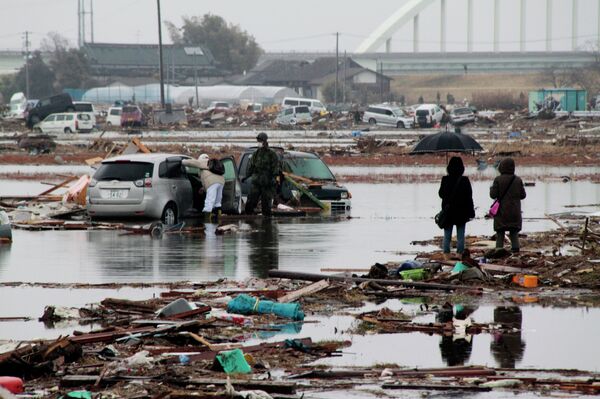On the outskirts of Natori, a mother and her child stand under an umbrella, looking over a village landscape in which every familiar element has been transformed. Houses have been stripped into uneven piles of wood and wreckage. Boats have been littered across the area, which sits more than ten kilometers inland from Japan’s eastern coast. Remnants of former lives, from televisions to children’s toys, have been thrown from their homes and strewn indiscriminately. Some former residents have returned here to look for missing family members, sometimes following descriptions of where they were last seen – if in a car, then a search is mounted for the car where the body may still remain. Barring the possibility of a nuclear disaster at the Fukushima reactors, the majority of the damage in this area has been done. But in the coming weeks, stories will flood out of the region, illustrating the scope of the tragedy.
Russia and Japan have put aside recent disputes in response to Japan’s devastating earthquake, but the issue of the Kurils has not disappeared
The morning after the earthquake, Russian President Dmitry Medvedev quickly pledged his support to help the Japanese weather the crisis. “Reports on the natural disaster that has gripped Japan – the strong earthquake and tsunami, which carried away human lives and brought considerable destruction – have been met here with heartfelt regret,” said Medvedev. “Russia is ready to offer the necessary help to overcome the consequences of this terrible tragedy.” Planeloads of rescue workers from the Emergency Ministry have been flown out to Japan, giving Russia the largest presence of any foreign aid in the country, Kommersant reported. Expectations of power shortages have been met by offers of additional gas deliveries, and condolences in Moscow have been expressed in the form of flowers left at the Japanese Embassy.
In the months preceding the earthquake, Russia and Japan had been embroiled in a tense war of words over the South Kuril Islands, a chain that Japan has long claimed are illegally being occupied by Russia. Russia’s sudden munificent offers of goods, manpower and sympathy stand in stark contrast to the poor relations that reigned little more than a week ago.
This is not the first time that a national tragedy has eased Russia’s sometimes strained foreign relations. In 2010, amidst long-standing tensions concerning a Soviet massacre of thousands of Polish soldiers and officers at Katyn during World War II, a plane carrying the Polish government to a memorial crashed in Russia’s Smolensk Region, killing the Polish President Lech Kaczynski and all others on board. A period of détente followed the catastrophe and the animosity between Poland and Russia seemed to calm in recognition of the blow dealt to the Polish nation. The earthquake and tsunami that slammed into Japan also hit the Kurils last Friday, and it seemed as though the latest disaster might produce a similar effect – burying the issue of the disputed territories beneath the waves.
Yet parallels between the two experiences should not be drawn so quickly, said Oleg Kistanov, the head of the Institute for Japan Studies at the Russian Academy of Sciences, because the basis of the tensions between the countries in the past is so dissimilar.
“I think that the connection is completely artificial between the two cases, which don’t relate closely to one another. The catastrophe in Japan is not a situation which will completely smooth over the basis of the conflict between itself and Russia. For Russia and Poland, there wasn’t a territorial problem. It just was a very tense moral and psychological situation between our countries, for many reasons. When the accident happened, we showed the better side of our country, and the Poles valued this. But it didn’t cost us anything – nothing was really given up.”
While tension over the issue was expected to calm down, there have been flare-ups of the controversy this week, despite the difficult situation in Japan. Apparently in response to a question from a journalist, the Japanese Ambassador in Moscow on Monday stated that the earthquake and the Kurils were “completely different topics,” Rosbalt agency reported. On Tuesday, Russian Foreign Minister Sergei Lavrov appeared on Japanese television, reminding his audience that “with regards to visits [to the islands] in general, this is our inalienable right and a strictly internal affair. Concerning this, we won’t consult with anyone.”
It seems that the two issues have been essentially divorced from one another, but it has remained clear that the issue of the islands, and the tension between the countries, won’t disappear completely. “Sooner or later everything will come back to normal,” said Kistanov. “I think that the issue will eventually come back to where it was before the catastrophe. The atmosphere might already be different, but the question will remain the same.”
Yet in Japan, normalcy seems terribly far away. Estimates of the expected dead have reached 15,000, with an expected 450,000 homeless. The statistics barely relay the horrors that people in the country have endured, and the reactors at Fukushima are now a critical problem. While not in complete panic, the population’s stress is showing all over, and facemasks, a precaution against possible radiation, have become ubiquitous on the streets of Tokyo.
While Russia has been one of the foremost countries responding to the disaster, it seems in the days to come that much more still may be expected. If the Kurils topic can remain on the back burner, Russia’s unique experience with nuclear disasters will serve as an invaluable resource in case of a further catastrophe. “Russia can offer what other countries can’t,” said Kistanov. “Above all, specialists in the sphere of atomic energy who have experience with handling the consequences of atomic disasters. I of course mean with Chernobyl.”




